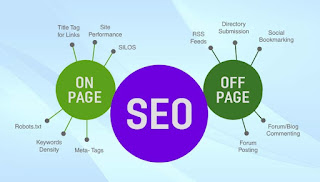- On-page SEO and off-page SEO are critical for raising a website's search engine rankings.
- On-page SEO is the process of improving specific web pages in order to improve their search engine rankings and attract more relevant traffic.
- To improve a webpage's search engine friendliness, this entails optimizing its content, HTML source code, and other components.
- Page titles, meta descriptions, header tags, and image alt tags can all be optimized using on-page SEO strategies.
- On the other hand, off-page SEO refers to improving a website's outside elements that may have an effect on its search engine rankings.
- This entails constructing backlinks from other websites that are of a high caliber as well as obtaining citations and mentions on other websites.
- Link building, social media marketing, and content marketing are examples of off-page SEO strategies.
- A website's success depends on both on-page and off-page SEO.
- Off-page SEO helps search engines understand the quality and relevance of a website based on the links and mentions it receives from other websites, whereas on-page SEO aids search engines in comprehending the purpose of a website and how it might benefit users.
- To raise a website's overall visibility and search engine rankings, it's critical to concentrate on both on-page and off-page SEO.
- For maximum effectiveness, an SEO strategy should combine both on-page and off-page strategies.
HOT POST
6/recent/ticker-posts
ON PAGE SEO VS OFF PAGE SEO
BLOG ANGLE OFFICIAL
January 03, 2023
Google Search Box
FACEBOOK PAGE PLUGIN
Labels
- ACTIVATION CODE
- ADSENSE
- AFFILIATE MARKETING
- AI
- ANDROID
- ANIME
- APPLE
- APPS
- ARTICLE
- BANK LOAN
- BLOGGER
- BLOGGING GUIDE
- BLOGGING TIPS
- BLOGSPOT
- CARTOON
- CHATGPT
- CINE NEWS
- CRICKET NEWS
- CRYPTO
- DIGITALMARKETING
- DOMAIN
- DOWNLOAD
- DOWNLOAD SOFTWARE
- FOOTBALL NEWS
- FREEBIES
- GAME CHARACTER
- GAME CHARACTERS
- GAME TURBO
- GAMES
- GET INSTAGRAM FOLLOWERS
- GET TELEGRAM FOLLOWERS
- GOOGLE ADS
- GOOGLE NEWS
- GOOGLE TOOLS
- GUEST POST
- HEADPHONE
- INSTAGRAM GUIDE
- INSTAGRAM TIPS
- INSTAGRAM TOOLS
- INSURANCE
- IPHONE
- KEYWORD TOOLS
- LAPTOP
- MARKETING
- MICROSOFT
- MOBILE
- MOBILE REVIEW
- MOBILE TIPS
- MONEY MAKING GUIDE
- MONITER
- MOVIES REVIEW
- MUTUAL FUNDS
- PLAYSTATION
- PROMO CODE
- SAMSUNG
- SEO
- SEO TIPS
- SEO TOOLS
- SMARTWATCH
- SOCIAL MEDIA
- SPEAKER
- TECHNOLOGY
- TELEGRAM
- THEMES
- TOOLS
- TRAILER
- TRENDING NEWS
- WEB HOSTING
- WEBSITE TIPS
- WIDGETS
- WINDOWS 11
- WINDOWS OS GUIDE
- WINDOWS OS TIPS
- WORD PRESS TIPS
- WORDPRESS
- WORDPRESS GUIDE
- WORDPRESS HOSTING
- WORDPRESS PLUGIN
- WWE
- X
- XBOX
- YOUTUBE
Popular Posts

MIDJOURNEY PROMO CODE JANUARY 2026
January 23, 2026

WEBTOON PROMO CODES JANUARY 2026 - 100% WORKING CODE
January 23, 2026
- January 2026105
- December 202579
- November 2025110
- October 202517
- September 20256
- June 20251
- March 202516
- February 202527
- January 202535
- December 20242
- October 20241
- September 20241
- March 2024152
- February 2024335
- January 202475
- December 202371
- November 202356
- October 202384
- September 202359
- August 20237
- July 20236
- June 202318
- May 20239
- April 202328
- March 202327
- February 202354
- January 202395
- December 202291
- November 202242
- October 202235

Blog Angle is another Platform site of Hacerneto. Blog Angle was created on October 2022. A platform to learn and grow as a blogger and digital marketer. 99% practical tips to create a blog & live your passion; the other 1% is for Digital News Basic & advanced Blogging, WordPress, SEO, and Social media marketing techniques. Digital marketing tips for bloggers, freelancers & Small businesses. Create a way to Increase Traffic in Blog & You Tube
FACEBOOK PAGE
Contact Form
Popular Posts

MyAscension Login Complete Guide 2025
February 13, 2025

WEBTOON PROMO CODES JANUARY 2026 - 100% WORKING CODE
January 23, 2026
Menu Footer Widget
Copyright ©
BLOG ANGLE



0 Comments